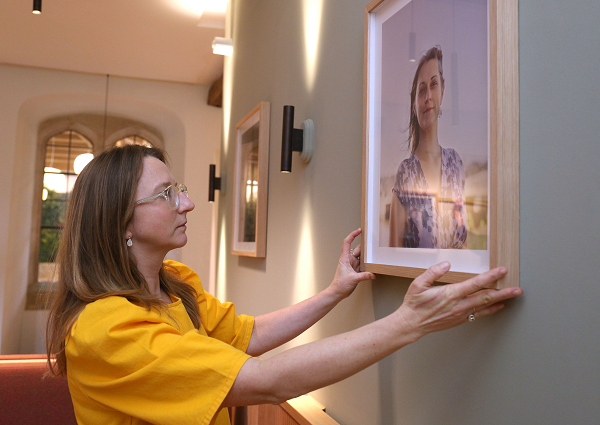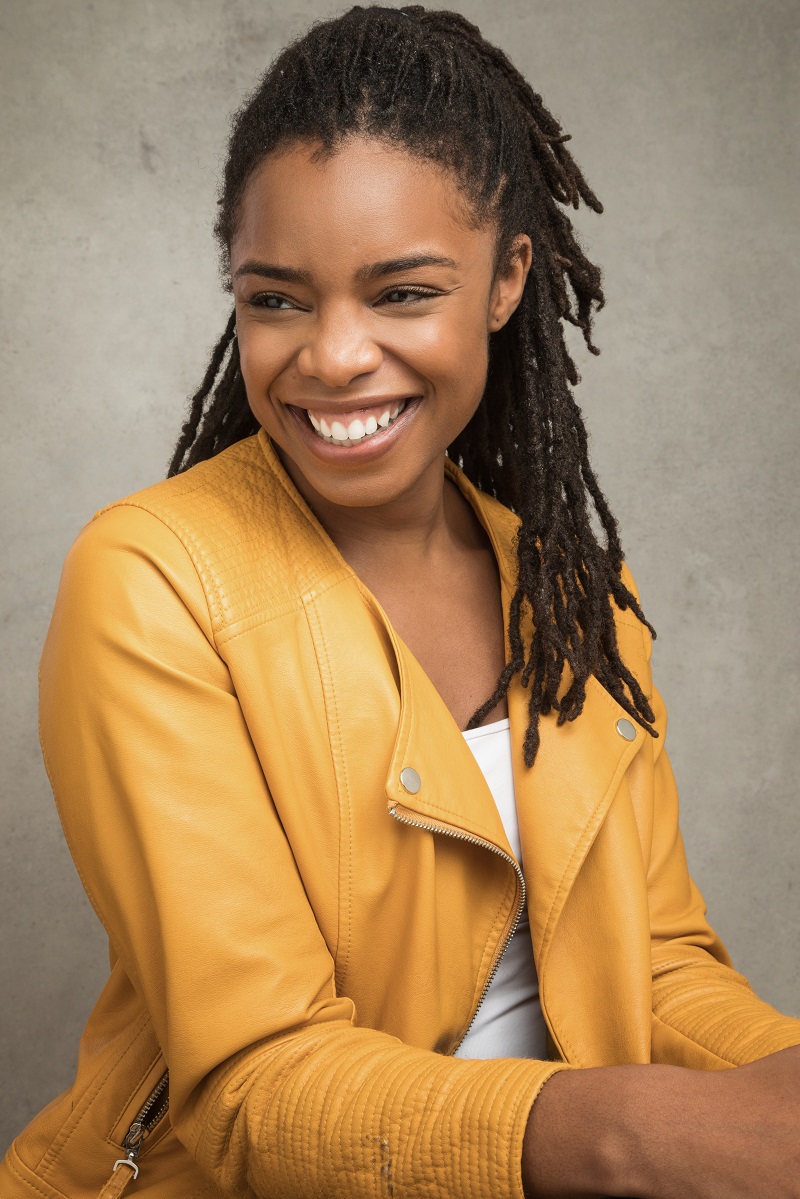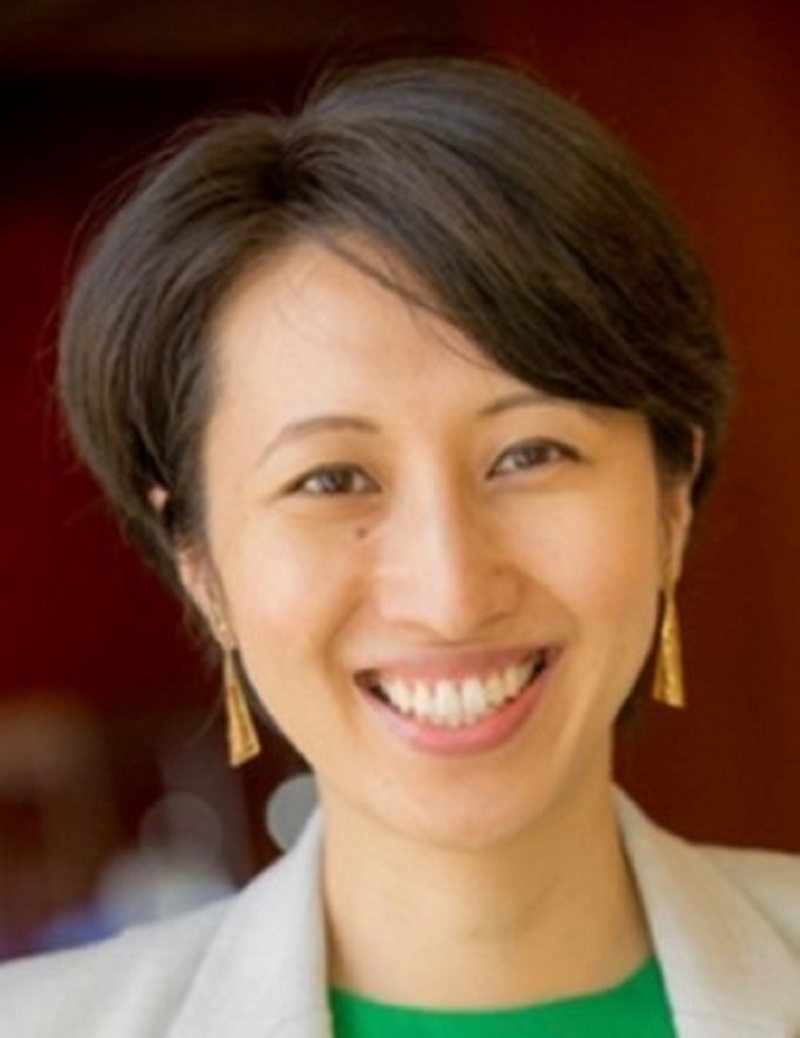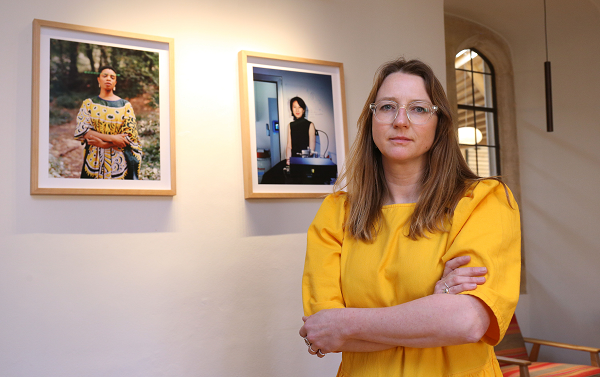Four decades of women at St John’s celebrated in new portrait exhibition
“Johnian women have been seizing opportunities to make their mark on learning, on the College and on the world”
Eight path-beating Johnian women, whose diverse careers have spanned the heights of government, the hidden worlds of human cells and the wild expanses of the Southern Ocean, are celebrated in a new exhibition of photographic portraits marking 40 years of women at the College.
Each alumna portrayed in the series, unveiled in the College’s new Café, has transformed the world around her, whether by using storytelling to advocate for minority women, researching the ground beneath our feet to improve building safety, or leading change within the spheres of law and the senior Civil Service.
The group includes women who were among the first female Johnians to reach key milestones in their chosen fields: MP, Liberal Democrat Sarah Teather; King’s Counsel Annabel Darlow; professor, Sarah Stallebrass of City, University of London; and ambassador, Fiona McIlwham. Writer Justina Kehinde Ogunṣeitan broke new ground even before leaving Cambridge as director of the University’s first all-black women’s theatre production, Hannah Carmichael OBE combines senior Civil Service roles with running the first social enterprise focusing on people living alone, while Julia Fan Li’s pioneering biotech firm uses machine vision to transform the way new medicines are discovered. Yachtswoman Sam Davies embodies the group’s adventurous spirit, competing in three Vendée Globes – solo races around the world – and now training for a fourth.
The portraits, which capture the eight subjects in their daily surroundings, were taken by the acclaimed photographer Kate Peters, who specialises in representations of women. They provide a contemporary counterpoint to the historic artworks displayed in Hall at St John’s, allowing the spirit and achievements of women and younger alumnae to be recognised.

The College was founded in 1511 by Lady Margaret Beaufort, but the first female Fellow was appointed in 1981 and women were not admitted as undergraduates until 1982. “Ever since, Johnian women have been seizing opportunities to make their mark on learning, on the College and on the world,” says St John’s Master Heather Hancock. “Their pioneering spirit in choosing to join St John’s has shaped our celebration of their influence and achievement over four decades.”
“I still remember how awestruck I was by the College buildings and history when I first visited John’s. It was a blissful, carefree few years”
In interviews conducted to accompany the portraits, the eight women photographed shed light on their varied careers and share memories of their time at St John’s, with many recalling being bowled over by the beauty of the College and of Cambridge. “I was the first in my family to go to university,” says McIlwham, who became the UK’s ambassador in Albania in 2009 and has worked as a diplomat in Bosnia and Iraq, in the Royal Household as private secretary to Prince Harry and Meghan Markle, and recently ran the Downing Street Foreign Affairs team orchestrating the Prime Minister’s engagement on Ukraine. “I still remember how awestruck I was by the College buildings and history when I first visited John’s. It was a blissful, carefree few years.”
For Teather, friendship at St John’s came early. Locking herself out of her room on the way to the shower one morning, a neighbour came to her rescue and remains a close friend three decades on. Intimidated by the transition to university after missing most of her schooling through ill-health, Teather overcame her academic fears to grow to love pharmacology. She almost pursued the subject as a researcher before turning to politics as way to address the big issues and make a difference at a local level.
The need to carve out her own space at university led to a blossoming in Ogunṣeitan’s creativity and advocacy. While studying English Literature and Social Anthropology, she co-founded FLY, an organisation that sought to provide a communal space for global majority women and non-binary students. She also directed and performed in the first all-black, all-female production on a Cambridge stage: Ntozake Shange’s For Colored Girls Who Have Considered Suicide When The Rainbow Is Enuf, motivated by a desire to ‘centre and uplift students who looked like me and came from backgrounds like mine’. After graduating, she worked in public health, before pursuing the creative arts as a means of continuing to tell the stories that mattered to her.

Women in earlier cohorts, often relative pioneers in their fields, recall encountering sexism when they entered the workplace. Darlow was mistaken for a secretary when she began her career as a barrister, but mentoring from senior colleagues encouraged her to progress, take silk and become a recorder and deputy High Court judge.
Covering a wide range of cases from banker misconduct in the 2008 crash, to young people alleged to be heading to Syria to commit jihad, she loves the variety of her chosen profession, and the stimulation of constant learning. While still concerned by the ‘attrition’ of women from the Bar when parenting pressures kick in, she notes that, “there are so many different fields of law and fascinating other jobs you can ally yourself to with a legal career. You don’t have to stay in the same field”.
McIlwham, too, found herself one of few women in many of her wide range of Foreign Office posts. “I’ve worked in war zones and crises, often in male-dominated environments, whether in Iraq or training with aspiring generals at our Defence Academy. Tirana, Albania, felt pretty daunting as a young, female ambassador in 2009. But I have learned that difference brings real power, a different perspective, a different voice and a different means to influence and shape things around you.”
The variety of a career in public service also attracted Johnian geographer Carmichael, who has worked across three government departments in a multitude of roles since joining the Civil Service Fast Stream 15 years ago. Specialising most recently in early years and childcare policy and delivery – a hot button issue with voters – she says, “I’ve had more amazing experiences than I can count, from the Ministers I’ve had the privilege to advise, through to seeing some of the positive impact of some of the programmes I’ve been part of on people’s lives.”
“A desire to further the common good”
Carmichael is typical of the eight women in seeking to use her hard-won skills and experience to ‘give back’ through an array of charity and volunteering roles which led to her being made an OBE for her work in 2016. Her new Living Well Alone Project, a small social enterprise, offers advice, support and community to anyone living solo for the first time – from students to young professionals, divorcees and those experiencing bereavement.
For Teather, a prominent career as a Liberal Democrat MP and minister in the 2010-15 coalition government provided the opportunity to drive change. She lists her proudest achievements as her campaign to change UK policy on Britons held in Guantanamo Bay, together with the end of the Home Office practice that saw children held in immigration detention. Nevertheless, she chose to step away from Westminster after 12 years to run a charity supporting destitute asylum seekers. “I wanted to work for change in a way that was more congruent with my values in terms of processes as well as the outcomes we were seeking.”
A desire to further the common good also informs the work of engineering graduate Fan Li, whose deep tech bio company, Micrographia Bio, applies machine learning to microscopy, making it possible to visualise proteins and their networks inside human cells at a previously unseen scale, and then make sense of the information.
Matching the disease signatures revealed by the technology to drug signatures can “hugely accelerate drug discovery”, Fan Li says. Like her fellow Johnians, she is in a minority as a woman running a life sciences start-up. “Women have such great ideas and great science, and we should shine more spotlights on them and their efforts.”

Stallebrass, a fellow Johnian engineer, looks not down microscopes, but down into the earth, exploring the most effective ways to support buildings and large-scale civil engineering projects.
She says, “I was sort of in love with the soil and I’ve remained in love with this concept of trying to make the soil work.” As a professor at City, she has now extended her passion for the subject by teaching others, while also collaborating on the development of a new form of structural support called a HIPER pile. The technology utilises more of the full strength of the surrounding soil, giving greater load capacity. Testing it out for real-world projects using a specialist geotechnical centrifuge brings Stallebrass the excitement of research and the joy of collaboration with her team.
“Invest in your friendships as well as your studies, make time to have fun and enjoy all the beauty and quirks that this wonderful university has to offer”
While her counterpart’s career is planted firmly in the ground, yachtswoman Davies is out on the water, facing some of the most punishing environments on the planet. The third engineer of the group, she turned her sailing hobby into her profession after leaving John’s, achieving an astonishing fourth place in her first Vendée Globe race in 2009.
A broken mast ended her second attempt, while in the third she completed the round-the-world course even after having to pull out of the race following a serious collision with an unknown object. Now, with her first ever new boat – a gleaming red Imoca-class ocean-going thoroughbred – the Brittany-based sailor is preparing to enter her fourth Globe in 2024. “I feel like I am capable of doing better and better,” she says. “That's the thing with this sport – experience counts for so much. I am naturally quite patient, so it was never a case of sailing round the world and then finding something else to do. I always want to do something the best I can, and that takes time and hard work and commitment.”
As well as the drive to succeed, Davies shares the Johnian women’s public service ethic: her voyages raise money for Initiatives-Cœur – a French charity that pays for young children with heart defects from the developing world to travel to France for life-saving surgery.
All eight women captured in our portraits encourage the female students following in their footsteps to make the most of their time at John’s, stressing that friendships and extra-curricular interests can be as important in building character and career as academic study.
“For those studying now – make the most of every second!” urges Carmichael. “This time is precious – the only time in your life where you are likely to have the space and time to spread your wings and work out where your real interests and passions lie. Invest in your friendships as well as your studies, make time to have fun and enjoy all the beauty and quirks that this wonderful university has to offer.” Teather echoes her advice: “Your career doesn’t have to be linear, and in the rather volatile world of today, flexibility born of breadth and different perspectives to the mainstream strikes me as a useful tool to be cherished.”
Ogunṣeitan offers a last word, underlining the power of finding one’s own path. “Sometimes the less linear the path, the more useful the life-lessons that will shape your stories. Move at your own pace, but keep moving, keep breathing, keep creating.”

Published 10/02/2023